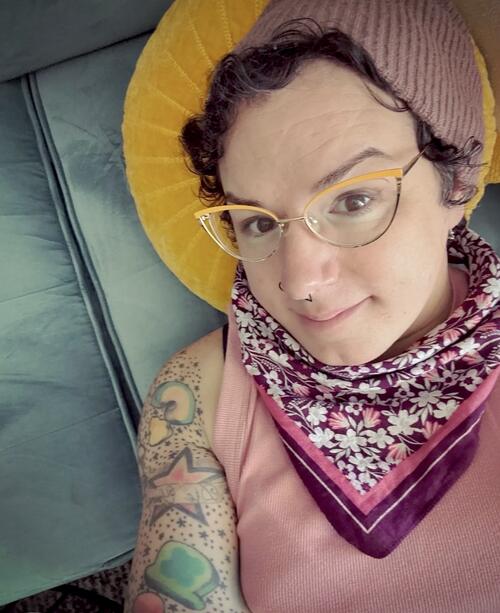Tonee Mae Moll | Guest Writer for MFA Program

Hood’s creative writing MFA program welcomes Tonee Mae Moll as a guest writer for June 2025 residency.
Q&A
Program
- Creative Writing (MFA)
Department
- English & Communication Arts
Tonee Mae Moll (she/they) is the author of the memoir Out of Step, which won a 2018 Lambda Literary Award and the 2017 Non/Fiction Prize. It was also featured on the American Library Association’s annual list of notable LGBTQ+ books. Her latest poetry collection You Cannot Save Here won the 2022 Jean Feldman Poetry Prize from Washington Writers’ Publishing House. She holds a Ph.D. in English from Morgan State University and an MFA in creative writing and publishing art from the University of Baltimore. She is an assistant professor of English at Harford Community College in Maryland. In the conversation below, Moll discusses multi-genre writing, intersectionality and the importance of celebrating diverse literary voices.
When did you first become interested in writing and what sparked your passion?
When I was a kid, I was a reader, which led me to writing my own little horror and fantasy stories, and hand-making a little novella where all the characters were named after my friends in, like, 4th grade. Then by high school, I was the sort of kid who read liner notes as I listened to CDs and did my best to transcribe lyrics from the radio, which was a path that led straight to writing poems and lyrics to punk songs. So early on, I wanted to be an author; it just took me a long time to take serious steps to make it happen.
Is there any overlap between your poetry and creative nonfiction? How do they feed into one another, and how do they differ?
Absolutely! One of my mentors early on in my own graduate studies told me: just write. Let editors and booksellers figure out genre. I’ve always tried to just do that. I write lyric things that are mostly true, and sometimes they’re shaped like stories, and sometimes they’re shaped like poems. That’s not a terribly new idea though—if we look at our oldest extant stories—Gilgamesh, the Iliad, the Vedas—they’re all in verse, because in pre-writing culture, poetry was also a utility. It aided in memorization. The history of poetics is all intertwined, so I think writers should be less concerned with the imagined boundaries between one genre and the next.
As an LGBTQ+ writer and activist, how does identity/sexuality inform your work?
Everything I’ve ever written is about gender (in one way or another). So being a queer and trans woman, living here, at this moment, is central to my work. That includes, of course, the content of my work, but also my poetics. The way I think about stories, about form, about genre, about craft: it’s all queer and feminist. This means so many things, but most of all, it means understanding how dominant notions of what makes for “good writing” has historically been formed in patriarchal and heteronormative cultures. It means responding to that fact with resistance.
Why do you believe it is important to celebrate diverse voices in the literary community?
Literature is one of the tools we use to share with each other what it means to be human. When there’s just one sort of voice that is doing that, just a few limited experiences, then that is what gets sold as “universal.” Often when folks talk about diverse voices, we talk about people of X identity “seeing themselves” in literature, and that’s crucially important, but I’m also interested in how urgent it is for people to see identities other than their own represented in literature, so that they understand that as part of what it means to be human. For example, literature from Chicana feminists is important to chicanas and feminists, of course, but it’s also critical for everyone else too, because it reminds us that being chicana and/or a feminist, being a woman generally, is also part of “the human experience.”
With your academic background, what do you see as the benefits of the low-residency model?
So many people consider this model because it allows folks the (brilliant and intentional) approach of growing as artists while still leaving time for work or family, and it’s perfectly suited for that. However, we shouldn’t overlook the fact that it is also a much more personalized approach to the study of writing! Students work more closely with faculty; they get more sustained attention and closer feedback than a traditional MFA, and that allows for more growth, specifically student-directed growth.
We’re thrilled to be hosting you at Hood College this year! What are your plans and hopes for your time as a guest writer at the low-res MFA program at Hood?
Thanks! I’m excited about the shape of the program and honored to be a part of it. Most of all, I am delighted for the opportunity to work so closely with poets who take their work seriously and are ready to build new things, make new connections and take their work to new places.
How do you think students can leverage their creative talents into professional careers?
There’s a mountain of evidence that shows how advanced study of language and creativity make folks better at all sorts of problem solving, and that makes them stronger in every sort of workplace, so there’s that. But beyond just one supporting the other, I hope that working artists consider how the two support each other. Our creative talents will take our careers to new places, but also those jobs we do beyond writing poems and stories inform our poems and stories!
Learn more about Hood’s low-residency creative writing MFA program.
Are you ready to say Hello?
Choose a Pathway
Information will vary based on program level. Select a path to find the information you're looking for!
